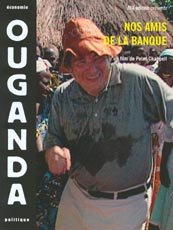
Our Friends at the Bank 1997
Distributed by First Run/Icarus Films, 32 Court St., 21st Floor, Brooklyn, NY 11201; 800-876-1710
Produced by Greg Lanning
Directed by Peter Chappell
VHS, color, 84 min.
College - Adult
Economics, Political Science
Date Entered: 11/09/2018
Reviewed by Scott Smith, Lorette Wilmot Library, Nazareth College, Rochester, NYThis program provides a look inside the case level functioning of the World Bank by following more than a year of negotiations between that body and the country of Uganda in the mid-1990s over financing, lending, and debt. The picture that emerges is not heartening. None of the players -- the World Bank itself, the Ugandan government officials and commercial representatives, and the agents of the International Monetary Fund (a group that one would think would be a close colleague of the World Bank, but which emerges as more of competitive rival) -- emerge unscathed. All are carefully calculating to see that their own interests and goals are met. Ugandan officials lobby for more economic support in the face of increased defense spending but are less than willing to discuss the particulars of the budget and the effectiveness of the military. World Bank middle level officials working directly on the Uganda case attempt to put forward just the right mix of economic statistics for potential lenders -- rich enough to be a sound country in which to invest but poor enough to need favorable investment treatment. And high level World Bank leaders appear, as the occasion merits, to be both sincere and duplicitous, bullying and supportive, neo-colonialist and supportive of Ugandan economic independence, finally completing a plan that provides an infusion of capital to relieve Uganda's foreign debt burden which, seemingly inevitably, leads to increased foreign debt burden.
There are no answers provided here, only observations which provoke questions. This program was the Silver Award Winner (FIPA 1998), Library Jury Prize Winner (Cinema Du Reel 1998), and 1998 Media Nord Sud. The visual technical quality is excellent, the audio is often muddy when shots are located in moving vehicles and large meetings; likewise, the mix of accents sometimes makes the dialogue difficult to follow -- closed captioning would have been an asset.
This program would be suitable for upper level high school and above audiences, mainly as a jumping off point for discussion, in areas including economics, political science, global studies, neo-colonialism, and current affairs. Recommended where there is demand.